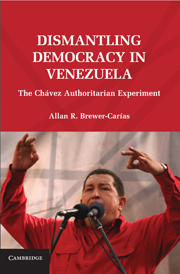Book contents
- Frontmatter
- Contents
- AUTHOR'S NOTE
- INTRODUCTION DEFRAUDING DEMOCRACY THROUGH NONCONSENSUAL CONSTITUENT ASSEMBLIES
- PART ONE THE POLITICAL ASSAULT ON STATE POWERS AND THE FRAMEWORK FOR AUTHORITARIANISM
- PART TWO INSTITUTIONAL DEVELOPMENT TOWARD CONSOLIDATING AUTHORITARIANISM
- PART THREE CONSTITUTIONAL REFORMS DESIGNED TO CONSOLIDATE AUTHORITARIANISM
- INDEX
INTRODUCTION DEFRAUDING DEMOCRACY THROUGH NONCONSENSUAL CONSTITUENT ASSEMBLIES
Published online by Cambridge University Press: 05 June 2012
- Frontmatter
- Contents
- AUTHOR'S NOTE
- INTRODUCTION DEFRAUDING DEMOCRACY THROUGH NONCONSENSUAL CONSTITUENT ASSEMBLIES
- PART ONE THE POLITICAL ASSAULT ON STATE POWERS AND THE FRAMEWORK FOR AUTHORITARIANISM
- PART TWO INSTITUTIONAL DEVELOPMENT TOWARD CONSOLIDATING AUTHORITARIANISM
- PART THREE CONSTITUTIONAL REFORMS DESIGNED TO CONSOLIDATE AUTHORITARIANISM
- INDEX
Summary
Democracy is much more than voting. It is a political regime in which, in addition to the holding of periodic, free, and fair elections based on secret balloting and universal suffrage as an expression of the sovereignty of the people, the following other essential elements are all ensured: respect for human rights and fundamental freedoms, access to and exercise of power in accordance with the rule of law, a pluralistic system of political parties and organizations, and separation of powers and independence of the branches of government.
This is what is set forth in Article 3 of the Inter-American Democratic Charter (Carta Democrática Interamericana), which members of the Organization of American States signed in Lima, Peru, on September 11, 2001 (the same day of the terrorist attacks in the United States). After so many antidemocratic and militarist regimes that have existed in Latin American history, and so many authoritarian regimes disguised as democratic that still have been developed there, adoption of a continental doctrine about democracy was an imperious necessity. That is why, in addition to the foregoing essential elements, Article 4 of the same charter included the following essential components of the exercise of democracy: transparency in government activities, probity, responsible public administration on the part of governments, respect for social rights, freedom of expression and of the press, constitutional subordination of all state institutions to the legally constituted civilian authority, and respect for the rule of law by all institutions and sectors of society.
- Type
- Chapter
- Information
- Dismantling Democracy in VenezuelaThe Chávez Authoritarian Experiment, pp. 7 - 32Publisher: Cambridge University PressPrint publication year: 2010



